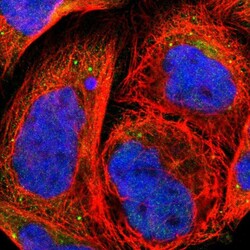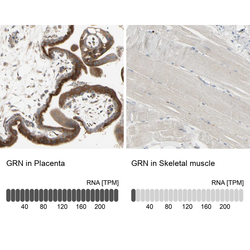Antibody data
- Antibody Data
- Antigen structure
- References [7]
- Comments [0]
- Validations
- Immunocytochemistry [1]
- Immunohistochemistry [1]
Submit
Validation data
Reference
Comment
Report error
- Product number
- HPA008763 - Provider product page

- Provider
- Atlas Antibodies
- Proper citation
- Atlas Antibodies Cat#HPA008763, RRID:AB_1850339
- Product name
- Anti-GRN
- Antibody type
- Polyclonal
- Description
- Polyclonal Antibody against Human GRN, Gene description: granulin, Alternative Gene Names: CLN11, PCDGF, PGRN, Validated applications: ICC, IHC, Uniprot ID: P28799, Storage: Store at +4°C for short term storage. Long time storage is recommended at -20°C.
- Reactivity
- Human
- Host
- Rabbit
- Conjugate
- Unconjugated
- Isotype
- IgG
- Vial size
- 100 µl
- Concentration
- 0.1 mg/ml
- Storage
- Store at +4°C for short term storage. Long time storage is recommended at -20°C.
- Handling
- The antibody solution should be gently mixed before use.
Submitted references Benzoxazole-derivatives enhance progranulin expression and reverse the aberrant lysosomal proteome caused by GRN haploinsufficiency
Neuron-specific gene NSG1 binds to and positively regulates sortilin ectodomain shedding via a metalloproteinase-dependent mechanism
Premature termination codon readthrough upregulates progranulin expression and improves lysosomal function in preclinical models of GRN deficiency
A High-throughput Bead-based Affinity Assay Enables Analysis of Genital Protein Signatures in Women At Risk of HIV Infection
Murine knockin model for progranulin-deficient frontotemporal dementia with nonsense-mediated mRNA decay
Intracellular Proteolysis of Progranulin Generates Stable, Lysosomal Granulins that Are Haploinsufficient in Patients with Frontotemporal Dementia Caused byGRNMutations
Human tumors instigate granulin-expressing hematopoietic cells that promote malignancy by activating stromal fibroblasts in mice
Tesla R, Guhl C, Werthmann G, Dixon D, Cenik B, Addepalli Y, Liang J, Fass D, Rosenthal Z, Haggarty S, Williams N, Posner B, Ready J, Herz J
Nature Communications 2024;15(1)
Nature Communications 2024;15(1)
Neuron-specific gene NSG1 binds to and positively regulates sortilin ectodomain shedding via a metalloproteinase-dependent mechanism
Overby M, Serrano-Rodriguez A, Dadras S, Christiansen A, Ozcelik G, Lichtenthaler S, Weick J, Müller H
Journal of Biological Chemistry 2023;299(12):105446
Journal of Biological Chemistry 2023;299(12):105446
Premature termination codon readthrough upregulates progranulin expression and improves lysosomal function in preclinical models of GRN deficiency
Frew J, Baradaran-Heravi A, Balgi A, Wu X, Yan T, Arns S, Shidmoossavee F, Tan J, Jaquith J, Jansen-West K, Lynn F, Gao F, Petrucelli L, Feldman H, Mackenzie I, Roberge M, Nygaard H
Molecular Neurodegeneration 2020;15(1)
Molecular Neurodegeneration 2020;15(1)
A High-throughput Bead-based Affinity Assay Enables Analysis of Genital Protein Signatures in Women At Risk of HIV Infection
Månberg A, Bradley F, Qundos U, Guthrie B, Birse K, Noël-Romas L, Lindskog C, Bosire R, Kiarie J, Farquhar C, Burgener A, Nilsson P, Broliden K
Molecular & Cellular Proteomics 2019;18(3):461-476
Molecular & Cellular Proteomics 2019;18(3):461-476
Murine knockin model for progranulin-deficient frontotemporal dementia with nonsense-mediated mRNA decay
Nguyen A, Nguyen T, Zhang J, Devireddy S, Zhou P, Karydas A, Xu X, Miller B, Rigo F, Ferguson S, Huang E, Walther T, Farese R
Proceedings of the National Academy of Sciences 2018;115(12)
Proceedings of the National Academy of Sciences 2018;115(12)
Intracellular Proteolysis of Progranulin Generates Stable, Lysosomal Granulins that Are Haploinsufficient in Patients with Frontotemporal Dementia Caused byGRNMutations
Holler C, Taylor G, Deng Q, Kukar T
eneuro 2017;4(4):ENEURO.0100-17.2017
eneuro 2017;4(4):ENEURO.0100-17.2017
Human tumors instigate granulin-expressing hematopoietic cells that promote malignancy by activating stromal fibroblasts in mice
Elkabets M, Gifford A, Scheel C, Nilsson B, Reinhardt F, Bray M, Carpenter A, Jirström K, Magnusson K, Ebert B, Pontén F, Weinberg R, McAllister S
Journal of Clinical Investigation 2011;121(2):784-799
Journal of Clinical Investigation 2011;121(2):784-799
No comments: Submit comment
Supportive validation
- Submitted by
- Atlas Antibodies (provider)
- Main image

- Experimental details
- Immunofluorescent staining of human cell line A-431 shows localization to endoplasmic reticulum & lysosomes.
- Sample type
- Human
Supportive validation
- Submitted by
- Atlas Antibodies (provider)
- Enhanced method
- Orthogonal validation
- Main image

- Experimental details
- Immunohistochemistry analysis in human placenta and skeletal muscle tissues using HPA008763 antibody. Corresponding GRN RNA-seq data are presented for the same tissues.
- Sample type
- Human
- Protocol
- Protocol
 Explore
Explore Validate
Validate Learn
Learn Immunocytochemistry
Immunocytochemistry